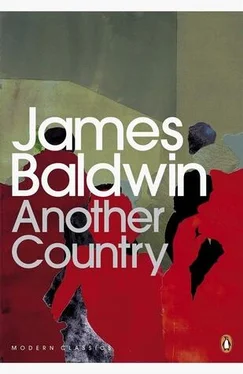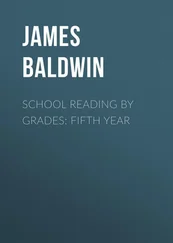“Richard,” she said, “that must be Rufus’s sister.”
“Well, go let her in. Don’t leave her waiting in the hall.” As he spoke, the bell rang again.
“Oh my God,” said Vivaldo, and he stood up, looking very tall and helpless. She put down her drink and went to the door.
The girl who faced her was fairly tall, sturdy, very carefully dressed, and somewhat darker than Rufus. She wore a raincoat, with a hood, and carried an umbrella; and beneath the hood, in the shadows of the hall, the dark eyes in the dark face considered Cass intently. There was a hint of Rufus in the eyes — large, intelligent, wary — and in her smile.
“Cass Silenski?”
Cass put out her hand. “Come in. I do remember you.” She closed the door behind them. “I thought you were one of the most beautiful women I’d ever seen.”
The girl looked at her and Cass realized, for the first time, that a Negro girl could blush. “Oh, come on, now, Mrs. Silenski—”
“Give me your things. And please call me Cass.”
“Then you call me Ida.”
She put the things away. “Shall I make you a drink?”
“Yes, I think I need one,” Ida said. “I been scouring this city, I don’t know how long, looking for that no-good brother of mine—”
“Vivaldo’s inside,” Cass said, quickly, wishing to say something to prepare the girl but not knowing what to say. “Will you have bourbon or Scotch or rye? and I think we’ve got a little vodka—”
“I’ll have bourbon.” She sounded a little breathless; she followed Cass into the kitchen and stood watching her while she made the drink. Cass handed her the glass and looked into Ida’s eyes. “Vivaldo hasn’t seen him since last night,” she said. Ida’s eyes widened, and she thrust out her lower lip, which trembled slightly. Cass touched her elbow. “Come on in. Try not to worry.” They walked into the living room.
Vivaldo was standing exactly as she had left him, as though he had not moved at all. Richard rose from the hassock; he had been clipping his nails. “This is my husband, Richard,” Cass said, “and you know Vivaldo.”
They shook hands and murmured salutations in a silence that began to stiffen like the beaten white of an egg. They sat down.
“Well!” Ida said, shakily, “it’s been a long time.”
“Over two years,” Richard said. “Rufus let us see you a couple of times and then he hustled you out of sight somewhere. Very wise of him, too.”
Vivaldo said nothing. His eyes, his eyebrows, and his hair looked like so many streaks of charcoal on a dead white surface.
“But none of you,” said Ida, “know where my brother is now?” And she looked around the room.
“He was with me last night,” Vivaldo said. His voice was too low; Ida strained forward to hear. He cleared his throat.
“We all saw him,” Richard said, “he was fine.”
“He was supposed to stay at my place,” said Vivaldo, “but we — I—got talking to somebody — and then, when I looked up, he was gone.” He seemed to feel that this was not the best way to put it. “There were lots of his friends around; I figured he had a drink with some of them and then maybe went off and decided to stay the night.”
“Do you know these friends?” Ida asked.
“Well, I know them when I see them. I don’t know — all their names .”
The silence stretched. Vivaldo dropped his eyes.
“Did he have any money?”
“Well”—he looked to Richard and Cass—“I don’t know.”
“How did he look?”
They stared at each other. “All right. Tired, maybe.”
“I’ll bet.” She sipped her drink; her hand shook a little. “I don’t want to make a big fuss over nothing. I’m sure he’s all right, wherever he is. I’d just like to know . Our Mama and Daddy are having a fit, and,” she laughed, catching her breath roughly, “I guess I am, too.” She was silent. Then: “He’s the only big brother I got.” She sipped her drink, then she put it on the floor beside her chair. She played with the ruby-eyed snake ring on her long little finger.
“I’m sure he’s all right,” Cass said, miserably aware of the empty sound of the words, “it’s just that — well, Rufus is like a lot of people I know. When something goes wrong, when he gets hurt, he just wants to go and hide until it’s over. He licks his wounds. Then he comes back.” She looked to Richard for help.
He did his best. “I think Cass may be right,” he murmured.
“I’ve been everywhere,” said Ida, “everywhere he ever played, I been talking to everybody I could find who ever worked with him, anybody I could find he’d even ever said hello to — I even tried relatives in Brooklyn—” She stopped and turned to Vivaldo. “When you saw him — where did he say he’d been?”
“He didn’t say.”
“Didn’t you ask him?”
“Yes. He wouldn’t say.”
“I gave you a phone number to call the minute you saw him. Why didn’t you call me?”
“It was late when he came to my house, he asked me not to call, he said he was coming to see you in the morning!”
He sounded helpless and close to tears. She stared at him, then dropped her eyes. The silence began to crawl with an acrid, banked hostility emanating from the girl who sat alone, in the round chair, in the center of the room. She looked in turn at each of her brother’s friends. “It’s funny he didn’t make it, then,” she said.
“Well, Rufus doesn’t talk much,” said Richard. “You must know how hard it is to get anything out of him.”
“Well,” she said, shortly, “ I would have got it out of him.”
“You’re his sister,” Cass said, gently.
“Yes,” Ida said, and looked down at her hands.
“Have you been to the police?” Richard asked.
“Yes.” She made a gesture of disgust and rose and walked to the window. “They said it happens all the time — colored men running off from their families. They said they’d try to find him. But they don’t care. They don’t care what happens — to a black man!”
“Oh, well, now,” cried Richard, his face red, “is that fair? I mean, hell, I’m sure they’ll look for him just like they look for any other citizen of this city.”
She looked at him. “How would you know? I do know — know what I’m talking about. I say they don’t care — and they don’t care.”
“I don’t think you should look at it like that.”
She was staring out of the window. “Goddamnit. He’s out there somewhere. I’ve got to find him.” Her back was to the room. Cass watched her shoulders begin to shake. She went to the window and put her hand on Ida’s arm. “I’m all right,” Ida said, moving slightly away. She fumbled in the pocket of her suit, then crossed to where she had been sitting and pulled Kleenex out of her handbag. She dried her eyes and blew her nose and picked up her drink.
Cass stared at her helplessly. “Let me freshen it for you,” she said, and took the glass into the kitchen.
“Ida,” Vivaldo was saying as she reentered, “if there’s anything I can do to help you find him — anything at all—” He stopped. “Hell,” he said, “I love him, too, I want to find him, too. I’ve been kicking myself all day for letting him get away last night.”
When Vivaldo said, “I love him, too,” Ida looked over at him, her eyes very big, as though she were, now, really meeting him for the first time. Then she dropped her eyes. “I don’t really know anything you can do,” she said.
“Well — I could come with you while you look. We could look together.”
She considered this; she considered him. “Well,” she said, finally, “maybe you could come with me to a couple of places in the Village—”
Читать дальше












